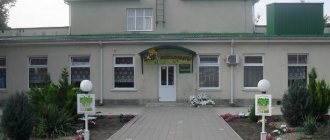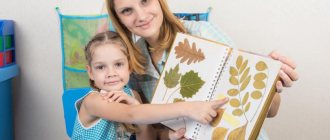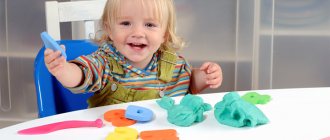Journey to the land of interesting games: a project for children of senior preschool age
Rizyapova I.I., Khabibullina V.N. Journey to the land of interesting games: a project for children of senior preschool age // Owl. 2022. N 4 (18). URL: https://kssovushka.ru/zhurnal/18/ (access date: 01/18/2022).
Order No. 431957
APPENDIX: Approximate game plan for the implementation of the project “Journey to the Land of Interesting Games”
Type of project : speech, cognitive and creative.
Implementation time: long-term.
Project participants: children 5-6 years old, 6-7 years old, teachers, parents of students.
Relevance of the topic:
Currently, the requirements of the educational system for the speech development of children have increased. The Federal State Educational Standard has defined as one of its objectives the development of the abilities and creative potential of each child as a subject of relationships with himself, other children, adults and the world. The comprehensive development of a preschooler can be achieved only on the basis of play activities, during which the child develops imagination and the symbolic function of consciousness, gains experience in communicating with peers, and comprehends moral values and rules of behavior in society.
In this regard, the issue of developing verbal creativity in preschool children using various methods and technologies is relevant.
Based on the above, goals and objectives were set for the development of verbal creativity of older preschoolers in the process of developing gaming technologies that stimulate verbal creativity and independence of children.
Goal: Development of speech creativity of preschool children in the process of play activities through inclusion in various types of activities, teach them to speak the Tatar language, develop dialogic and monologue speech.
Tasks.
Educational:
- to cultivate independence, initiative through the organization of play activities, positive relationships between children and adults.
- cultivate a desire to communicate in the Tatar language.
Educational:
- develop variable thinking, imagination and creative abilities, curiosity, observation, the ability to experiment, create conditions for the formation of fantasy, imagination, and creativity.
- improve all aspects of speech: achieve clear pronunciation of all sounds of the native language, expand and activate the vocabulary, continue to develop dialogical speech,
- develop interest in learning the Tatar language, promote speech understanding and the desire to speak and communicate in another language.
Educational:
- teach word creation;
- teach forms of monologue speech in the Tatar language;
- teach answering questions in a short and common form.
Project implementation principles:
- Accessibility: taking into account the age characteristics of children; adaptability of the material.
- Systematicity and consistency: gradual presentation of material from simple to complex; frequent repetition of acquired knowledge, rules and norms.
- Visual and entertaining: the proposed material must be understandable, have an entertaining beginning, be playful or have elements of a game or surprise.
- Dynamism: integration of the project into different activities.
- Supporting children's initiative in various activities.
- Taking into account the individual characteristics of each child.
- Introducing children to sociocultural norms, traditions of the family, society and state.
Stages of work on the project
Stage I – information and analytical support for the project.
- Collection and analysis of information.
- Selection and study of literature on project activities.
- Study of advanced pedagogical experience in developing children's ideas about play.
- Selection of methods for pedagogical diagnostics of pupils and parents (observation of children, individual conversations).
- Analysis of the results of pedagogical diagnostics.
Stage II - main
Scheme for implementing work experience in areas of development
| Directions of development | Types of games in joint activities of adults and children and independent activities of children |
| Social - communicative | Didactic, role-playing, nature history games. Board games, word games, bonding games, social interaction |
| Speech | Didactic games, speech games |
| Cognitive | Didactic games, word games, educational games, board and printed games, games with mathematical content |
| Artistic and aesthetic | Games - dramatization, games - dramatization, folk games, games - round dances, logorhythmics |
| Physical | Outdoor games with words, games with speech accompaniment, physical exercises, logarithmics, motor games. |
Stage III – final
Generalization of work experience.
Collaboration with parents
- Visual information: consultations “Speech development: games with the family”, “Games for the development of creative imagination”. Recommendations for parents “Game is serious”, “The world in a child’s creativity.” Publication of the pedagogical and parent newspaper “Krepysh”.
- Children and parents projects: “Creative workshop”, “Interesting games”, “Dreamers”, “Rhyme”.
- Step-by-step drawing: “You start, and I will continue.”
- Exhibitions of drawings: “Fairytale World”, “Abracadabra”, “Nonexistent Country”.
- Questionnaire: “Does your child like to fantasize?”
- Baby dictionary “Our children come up with it.”
- “Parents’ Diary or “Nechukovsky” from 2 to 5.”
- Competition of inventions: “Funny story”, “Changes”.
- Training “Sharing family experience.”
- Mailbox "Question and answer".
- A collection of ideas: “An unusual toy.”
- Family gatherings.
Expected result of project activities:
- To introduce children to the process of cognition through involving them in various types of practical and play activities.
- Develop cycles of game-activities for sections of the project, each of which would combine elements of different types of activities.
- Create a positive microsociety where each participant (adult and child) develops in the process of joint activity and co-creation.
- Increase the authority of the teacher and other preschool employees.
- Increase the pedagogical competence and activity of parents.
- Invite kindergarten teachers to participate in the implementation of the project to create comfortable conditions for the child.
- Teach children to speak the Tatar language, develop dialogic and monologue speech.
- Encourage parents to want to independently organize joint, creative games with their children at home.
Approximate game plan for the implementation of the project “Journey to the Land of Interesting Games” (Appendix).
Literature:
- Dyachenko O.M., Agayeva E.L. What doesn't happen in the world? 2001.
- Zaripova Z.M. Tatarcha sөylәshәbez // Methodology kullanma. Kazan, 2012.
- Karpova S.I., V.V. Mamaeva. Development of speech and cognitive abilities of preschoolers 4-5 years old // Creative Center. St. Petersburg, 2010.
- Kukushkina E.Yu., Samsonova L.V. Playing and learning to be friends // Teacher's Library. M.: Creative Center, 2013.
- Miklyaeva N.V. Interactive pedagogy in kindergarten // Library of the journal “Preschool Education Management”. M.: Creative Center, 2012.
- Miklyaeva N.V., Reshetilo E.A., Lopatina O.G. Play environment at home // Teacher's Library. M.: Creative Center, 2011.
- Miklyaeva N.V., Yu.N.Rodionova. Developing the abilities of preschoolers // Teacher's Library. M.: Creative Center, 2010.
- Penkova L.A., Konnova Z.P., Malysheva I.V., Perkova S.V. Development of play activity of preschoolers // Management. M.: Creative Center, 2010.
- Skorolupova O.A., Loginova L.V. Let's play?.. Let's play!!! From work experience. M., 2006.
- Shchetinina A.M. Teaching preschoolers to think // Teacher’s Library. M.: Creative Center, 2011.
Project “Game activities in the senior group”
2. Role-playing game “Library”. Goal. Learn to coordinate your own game plan with the plan of your peers. Display knowledge about the surrounding life in the game, show the social significance of libraries. Expand ideas about library workers, establish rules of behavior in a public place.
3. Outdoor games “Shooting at a target”, “Sunny rain”. Target. Develop interest in outdoor games, the ability to coordinate your actions with friends.
NOVEMBER
1st week
1. Didactic game “Collect beads.” Didactic task. Teach children to group shapes by shape, color and size. Ability to work in pairs.
2. Plot-based role-playing game “Theater” Goal.
Teach children to act in accordance with the role they have assumed, to form a friendly attitude among themselves. To consolidate children’s ideas about cultural institutions and their social significance.
3.Game with large building material “The House We Live In.” Target. Teach children to carry out spatial analysis of a building, build a house according to given rules, and develop communicative communication.
2nd week
1. Didactic game “Say further.” Didactic task. Continue to learn to establish the sequence of parts of the day, days of the week. Be able to listen and hear each other.
2. Plot-based role-playing game with the teacher “Hospital”. Target. Reveal the meaning of the activities of medical personnel. Formation of the ability to creatively develop the plot of the game. Fostering respect for the medical profession.
3.Finger game “Flower”. Target. Development of fine motor skills of fingers and hands. Develop children's communication skills.
3rd week
1. Didactic game “Freeze.” Didactic task. Teach children to understand a schematic representation of a person, to activate the process of attention. Continue to develop the ability to play in a team.
2. The plot is a role-playing game “Hospital”. Target. Strengthen the ability to take on a role and perform appropriate game actions, use medical instruments during the game and name them; promote the emergence of role-playing dialogue, form a sensitive, attentive attitude towards the sick person, and evoke sympathy for sick toys.
3. Games-experimentation with a magnet Purpose. Teach children to find metal objects using a magnet. Develop observation, attention, and the ability to play together.
4th week
Week of games and toys.
DECEMBER
1st week
1. Didactic game “Find a toy.” Didactic task. Teach children how to navigate the playroom according to plan. Continue to develop the children’s ability to play together and help each other.
2. The plot is a role-playing game “Zoo”. Target. Enrich and concretize children's knowledge and ideas about wild animals and their habits and conditions of captivity. Foster respect for the work of zoo workers. Instill love for animals, cultivate a sense of kindness and pity.
The amazing world of the game. (project) project (senior group)
Problem
How to help children organize role-playing games in the process, increase speech activity, accumulate emotionally positive experience, a necessity for the development of the social sphere.
Relevance of the project
Preschool childhood is the most important period of personality development. During these years, the child acquires initial knowledge about the life around him, he begins to form a certain attitude towards people, towards work, develops skills and habits of correct behavior, and develops a character. The main activity of preschool children is play; it develops the child’s spiritual and physical strength; his attention, memory, imagination, discipline, dexterity. In addition, play is a unique way of learning social experience, characteristic of preschool age. In play, all aspects of a child’s personality are formed and developed; significant changes occur in his psyche, which prepare the transition to a new, higher stage of development.
With the adoption of the Federal State Educational Standard, play becomes the content and form of organization of life. Game moments, situations and techniques are included in all types of children's activities and communication between the teacher and preschoolers, that is, we, teachers, must saturate life as much as possible with play and emotional events. Play has always been and remains the best means of educating and teaching preschoolers.
One of the main play activities for children is role-playing play. Role-playing is based on interpersonal relationships that are realized in the process of communication. Role-playing play can be classified as educational games, since it largely describes the choice of language means, promotes the development of speech skills and abilities, and allows one to model children’s communication in different speech situations.
Target
Development in children of primary preschool age of interest in various types of s/r games in the process of encouraging independent gaming creativity, to implement the planned plot of the game.
Tasks:
- Develop and enrich play activities with toys
- Create conditions for the development of fantasy, creativity, imagination.
- To develop the ability to observe basic rules of behavior during the game (the ability to act according to the rules), to act in one’s role.
- Foster friendly relationships between children, interest in the common plan and coordination of actions.
- Develop speech activity: activation and enrichment of vocabulary, development of dialectical speech.
- Help parents create conditions for children to play and expand knowledge on managing play activities.
Main forms of project implementation
Excursions, observations, morning conversations, reading fiction, mini-exhibitions, show jumping, photo exhibition “Mom, Dad, I am a friendly family,” work with parents (consultations, recommendations, conversations, homework).
Expected results of the project:
- Children reflect developed plots in games. They actively master methods of role-playing behavior, name their role and address peers by the name of the role-playing character, change the intonation of their voice depending on the role.
- Children have favorite games and roles that they are most willing to perform.
- They understand the game task and act in accordance with it.
- Show interest in playful communication with peers.
Project type: research and creative.
Project participants: children of senior group No. 1, teacher, parents of students.
Duration: 9 months (September – May), long-term.
Used Books:
1. Ushakova O. S. Development of speech and creativity of preschool children. Games, exercises, lesson notes. Creative Center SPHERE Moscow 2005
2. Development of gaming activities. N. F. Gubanova.
Publishing house MOSAIC - SYNTHESIS Moscow, 2014.
3. Internet sources.
Project progress
Stage 1 – preparatory (project development), period from September 1, 2018. until September 29, 2018
Stage 2 – practical (project implementation), period from October 2, 2018. until 04/30/2019
Stage 3 – final (summarizing), deadline from May 1, 2019. until 05/31/2019
Roadmap of the project “The Amazing World of Game”
| № | Content | Deadlines | Responsible |
Preparatory stage
Work with children
| 1 |
| September | Pyatanova E.I. |
| Working with parents | |||
| 1 |
| September | Pyatanova E.I. |
Practical stage
Work with children
| 1 |
| October | Pyatanova E.I. | |
| 2 |
| November | Pyatanova E.I. | |
| 3 |
| December | Pyatanova E.I. | |
| 4 |
| January | Pyatanova E.I. | |
| 5 |
| February | Pyatanova E.I. | |
| 6 |
| March | Pyatanova E.I. | |
| 7 |
| April | Pyatanova E.I. | |
| 8 |
4. D/I “Whose children?” | May | Pyatanova E.I. | |
| Working with parents | ||||
| 1 |
| September | Pyatanova E.I. | |
| 2 |
2. Exhibition “Gifts of Autumn”. | October | Pyatanova E.I. | |
| 3 | 1. Consultation “Holding a holiday at home.” | November | Pyatanova E.I. | |
| 4 | 1. Memo “Talk to your child.” | December | Pyatanova E.I. | |
| 5 | 1. Involve substitute items in the production: curlers, scissors. 2. Competition “Braid - girlish beauty”. | January | Pyatanova E.I. | |
| 6 |
3. Consultation “The role of the father in raising a child.” | February | Pyatanova E.I. | |
| 7 |
2. Consultation “The role of toys in children's games.” | March | Pyatanova E.I. | |
| 8 | 1. Making substitute items: thermometers, pills. | April | Pyatanova E.I. | |
| 9 | 1. Exhibition. Joint drawing of parents and children “Unusual animal”. | May | Pyatanova E.I. | |




